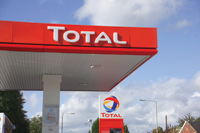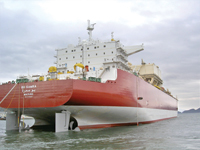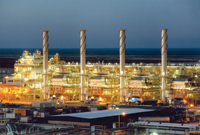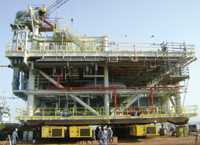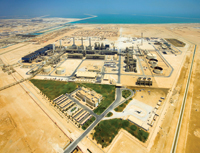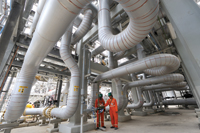
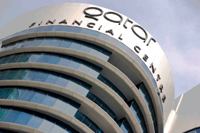 QFC ... looking at more investments in manufacturing sectors
QFC ... looking at more investments in manufacturing sectors
QATAR Petroleum’s finance director, Abdulrahman Al Shaibi, is the most powerful man in Qatar outside the royal family, says a banker. At international banks, this is especially true for bankers in loans and debt capital markets.
Al Shaibi’s unit manages all the financing and investments made by the national oil and gas company – as well as its growing subsidiaries in steel and petrochemicals, at home and abroad.
He is also someone who’ll be pitched for mandates to book-run Qatar’s ever more regular sovereign bonds.
If finance is raised for such companies as Qatar Airways, Qatar Telecom (Qtel) or Qatar National Bank – Qatar’s rapidly expanding flagship firms – it is Al Shaibi and his staff who will decide if it can go ahead and at what price. “Our role is to oversee the various activities of the government-related entities, to make sure the financing plans are coordinated and orchestrated,” Al Shaibi says.
To give one example, the banks mandated on a $5 billion Qatari sovereign bond in November – Citi, HSBC, JPMorgan, Mitsubishi UFJ, QNB Capital and Standard Chartered – had all provided a large chunk of the $3.34 billion commercial loan for QP’s domestic-orientated Barzan gas project earlier in the year.
Similarly, when QNB issued a $1 billion five-year bond in February, the unit had to give its approval and make sure the price – 10 basis points more than the sovereign – was comparable to what other state-linked entities would pay.
QP’s dominance of dollar financing in Qatar dates from when it embarked on a series of investments in liquefied natural gas some 10 years ago. Having reached its targets last year, Qatar is now the world’s largest exporter of LNG, earning around $7 billion a month, according to RBS. The emirate has gone from being one of the Gulf’s poorer states to one of its richest. But it is still one of the least experienced in managing petrodollars.
Qatar’s strategy, notes RBS research, appears to be to invest surplus revenues abroad via its sovereign wealth fund, while relying on debt for domestic development. The unit is a vital part in making sure dollar financing is available at a good price for this strategy.
Its influence over Qatari state-linked issuance partly derives from its sway over the state finance policy committee (SFPC). This is something like a supercharged debt management office, coordinating financings for the sovereign and for all government-related entities. Finance minister Yousef Kamal heads the SFPC, and Al Shaibi is a member.
Meshaal Al Mahmoud, head of project finance at QP, is also the committee’s secretary, as well as a right-hand man to Al Shaibi. Al Mahmoud and others within QP’s finance directorate, including Anthony Gouveia – former director of project and export finance at Standard Chartered – are members of the committee’s advisory board, which carries out much of the SFPC’s day-to-day business.
For the larger and more sophisticated state-owned corporates such as QNB and Qtel, the job is to make sure they are not competing for the same source of financing at the same time. But for other state-linked entities as well as the sovereign itself, it is up to the SFPC and its advisory team to work with DCM bankers, go on deal roadshows and answer investors’ questions – in other words, to manage the issue.
“We lead and coordinate the transaction on behalf of the state of Qatar,” says Al Mahmoud when talking of the emirate’s sovereign bond issuance.
Government-related entities tapping the credit markets, says Al Shaibi, must also demonstrate to the SFPC that they will be able to service the debt they are raising.
“We take into consideration the level of debt – public sector and government debt. So from that perspective we are very conscious we are rated AA-,” he says.
“Qatar’s fiscal situation is very strong, but we are watching things very carefully.”
Qatar’s GDP has more than doubled in the past five years. That is allowing banks and investors to raise their country limits for Qatar. It is also enabling Qatar, says Al Shaibi, to borrow more.
Qatari state and state-linked issuance is therefore expanding rapidly. According to RBS, Qatar’s gross public debt has tripled since 2009. Last year’s $5 billion sovereign bond, for example, follows sovereign issuance in 2009 of $3 billion in April and $7 billion in November. The latter was one of the largest ever sovereign Eurobonds.
During the past three years, flagship state-owned corporates such as Qatar Airways, Qatar Telecom and state-owned developer Qatari Diar have grown aggressively, partly on the back of international debt financing. Qatari Diar, for example, which is redeveloping London’s Chelsea Barracks among other projects at home and abroad, issued a bond in 2010 for $3.5 billion.
Al Shaibi argues that these financings contribute to the profitability, and not just to the renown, of what he calls Qatar Inc. According to Al Shaibi, government-owned entities and the sovereign can only get the SFPC’s approval to issue debt when it is for capital expenditure projects that will yield demonstrable returns to the state. “We are very careful on how government-related entities utilise the money [from debt financing],” he says.
However, Qatar’s ambitions are not easing up. Qtel – which issued Eurobonds of $1.5 billion each in 2009 and 2010 – was reportedly in talks to buy Saudi’s Oger Telecom, the owner of Türk Telekom, which has a market capitalisation of around $15 billion, and Cell C, the third-largest mobile operator in South Africa. QNB has also been in talks to buy Turkey’s DenizBank this year.
QP is regarded as a flag bearer for Qatar too: a so-called Q company. This year it has signed joint venture agreements to build oil refining and petrochemicals plants in China and Vietnam alongside local partners. QP is considering similar investment in a power plant in Dubai. The firm is looking into raising finance specifically for these international projects, Euromoney understands.
Added to that, QP plans to build bigger steel plants at home for the infrastructure and real-estate construction sectors. Another plan is to double Qatar’s domestic petrochemicals production by 2020 – mainly via QP and its 70 per cent-owned subsidiary Industries Qatar.
Since December, QP and its petrochemicals subsidiary Qapco have announced agreements to build two new petrochemicals plants in Qatar at a cost of around $5 billion each. QP is appointing financial advisers for these projects, and early last month RBS was appointed as financial adviser for one of the projects.
Bonds and even equity listings could be part of the overall financing package.
“Our ultimate objective is to avoid drying up liquidity in the bank market for one project,” says Al Mahmoud when speaking of potential capital markets issuance for the projects. QP’s scope to raise new debt for these projects has increased as LNG project financings are now being repaid.
Al Shaibi says that QP is considering a debut benchmark-sized sukuk, in what would be the first issuance in the Islamic capital markets by QP or its subsidiaries.
“We want to establish our brand in all markets and reach as many investors as possible in different geographic locations,” says Al Shaibi. “We don’t want to be exposed to a single financing market.”
Again, the aim would partly be to facilitate issuance by other Qatari government-related entities, including QP’s subsidiaries. Furthermore, the sukuk could be issued at corporate rather than project level – potentially the first corporate-level issuance in the capital markets by a big Middle Eastern national oil company.
Qatar won its bid for the 2022 Fifa World Cup just over a year ago; now it is bidding to host the 2020 Olympics. This is leading to even bigger plans for state-led domestic investment in real estate and infrastructure – a policy document last year commits $60 billion from Qatari state-linked corporates by 2016, including $27 billion by property developer Qatari Diar and its subsidiaries.
According to an analyst, hosting the World Cup could cost Qatar $220 billion.
Lawyers in Qatar say the legal complexity and lack of precedent in the Gulf for commercially financing roads, bridges, railways and the planned metro might mean these projects have to rely on cash directly from the government. That could mean more sovereign issuance.
Al Mahmoud says the state will decide on new sovereign Eurobond issuance for 2012 after the government’s budget is formulated in early spring. “We are committed to keeping a liquid curve for the Qatari sovereign in the Eurobond market by issuing on a regular basis,” he says.












































































